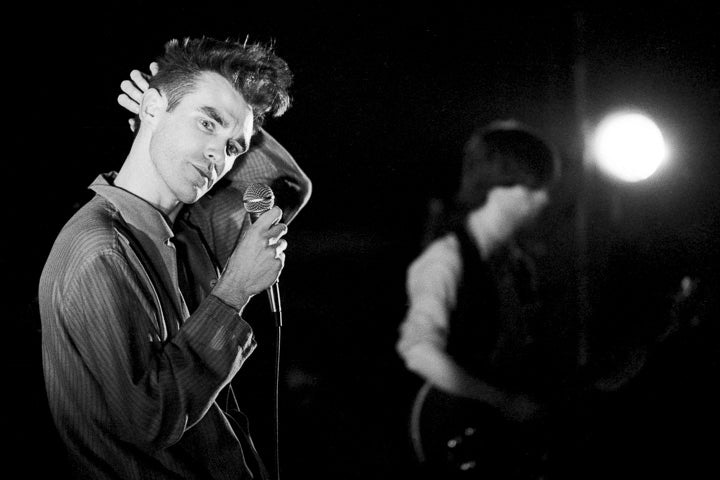
Hi Readers, I’m excited to start featuring guest posts here at Alive in the Nineties by other writers and music fans. There are pieces coming by Madison Jamar, Nikki Volpicelli, Rob Janicke, and Joshua James Amberson. Here’s the first, by Matthew Duffus, about connecting with Morrissey:
Years before two members of The Smiths sued their singer Morrissey over royalties, years before he became the unfiltered mouthpiece for bad ideas, the Manchester baritone was the musical discovery that changed my adolescence.
I was 17 when Morrissey released his third solo album, Your Arsenal, in 1992, and I became obsessed with it as soon as I saw the video for “Tomorrow” on MTV. Shot in black and white, Morrissey and his sharply clad band roam narrow city streets, alternately mugging for and ignoring the camera. In an era of showy videos like Guns N’ Roses’ “November Rain” and U2’s “Even Better Than the Real Thing,” the starkness of Morrisey’s video was much of its appeal. Though the video did make it to MTV, its visual simplicity might have also been its downfall. The song reached Number 1 on the Billboard Hot Modern Rock Tracks chart, but I only remember the video appearing one time on MTV. Even my father couldn’t avoid seeing “November Rain.”
Born Steven Patrick Morrissey in 1959, Morrissey grew up in working-class Manchester, England. At age 23, he and guitarist Johnny Marr formed The Smiths, the band that All Music called, “the definitive British Indie rock band of the ’80s, marking the end of synth-driven new wave and the beginning of the guitar rock that dominated English rock into the ’90s.” The band would only last 5 years, but in that time, they released 4 studio albums and spawned numerous compilations and live albums. After Marr left, Morrissey struck out on his own, beginning a solo career that continues to this day. Though he has never reached the same level of critical acclaim as The Smiths achieved, he has grown even more popular. His rabid fanbase spans much of the world. Fiona Sturges of England’s The Independent went so far as to state, “Most pop stars have to be dead before they reach the iconic status he has reached in his lifetime.” In 2019, he even made it to Broadway, performing for a week at Lunt-Fontanne Theatre.
Back in high school, I lived in the music wasteland of far western Maryland, where locals joked that Beltway news channels thought the state ended an hour east of us and that the legislature would be willing to sell us to West Virginia, which lay only 10 minutes away. As a result, my music-store options were chains Disc Jockey and Camelot, not the hip underground shops I would discover in college, in Chicago and Seattle. The salesclerk at D.J. looked at me blankly when I asked for Your Arsenal. Camelot had one copy, in their nascent alternative music section. It was the only Morrissey album on offer, and since it would be months before I would discover The Smiths, it was my lone purchase. I studied the cover: a concert shot of Morrissey brushing a fist across his mouth with his shirt open, abs on display, famous quiff so large it exceeded the camera’s framing. This was not the permed, teased hair-band locks of Poison, Motley Crüe, or Def Leppard, the commercial metal that seemed to play on an endless loop on television. It wasn’t even the long, Grunge-style hair I had become familiar with, and would soon emulate, thanks to Nirvana and Pearl Jam’s popularity. Morrissey was his own man. I was becoming such a person myself.
I’d completed a years-long extrication from the friend group I’d been a part of since sixth grade, tired of their aggressive posturing and academic arrogance, but I had yet to find a replacement. I was a marching band nerd, but even that didn’t suffice as an identity at my high school. For a short period of time, around the release of Your Arsenal, I was as independent as I imagined Morrissey was. I had plenty of acquaintances but no true friends. Like Morrissey, and perhaps as a result of my new fandom, this didn’t bother me.
Your Arsenal opens with the kind of brash guitar riff that was new to Morrissey’s solo music. Guitarists Alain Whyte and Boz Boorer added a rockabilly sensibility to his sound that leavened the melancholy brooding. Of course, when it comes to Morrissey’s solo material, the lyrics are what count, and that opening track, “You’re Gonna Need Someone on Your Side,” does not disappoint. It opens with typical Morrissey swagger: “With the world’s fate resting on your shoulders / You’re gonna need someone on your side.” Sitting in my bedroom, this new album blasting from my parents’ old speakers, I pondered these lyrics. The song contains only two verses and a chorus. Its three-and-a-half minutes are mostly instrumental. This imbalance was part of its appeal. While I nodded my head to the guitar licks, thumping bass line, and propulsive drumming, I scrutinized those few lyrics for deeper meaning. Replaying the first track, I thought about the ego of a singer who insisted he was the answer to the call for “someone on your side,” even as he insisted, “Well, you don’t need to look so pleased,” clearly meant ironically. As I would learn during the rest of my initiation into Morrissey, he never thought anyone was happy to see him, stage-bombing fans notwithstanding.
The slower “We’ll Let You Know” captured my attention just as much as the opening track. This, I would come to learn, was classic Morrissey: medium-slow tempo, ambient noise, and heart-on-his-sleeve lyrics:
How sad are we?
And how sad have we been?
We’ll let you know, we’ll let you know
Oh, but only if you’re really interested
You wonder how
We’ve stayed alive ’till now
We’ll let you know, we’ll let you know.
Sadly, the song ends with a hint of the exclusionary politics Morrissey has recently become associated with: “We are the last truly British people you will ever know / You’ll never never want to know.” Unlike the Morrissey of “Glamorous Glue,” who claims he’ll never vote conservative, here he seems to suggest that the third-person protagonist of “The National Front Disco” is correct in declaring, “England for the English / England for the English!” Though Morrissey distanced himself from the controversy surrounding this song by cutting the reference to the far-right National Front political movement in his performances, his more recent comments suggest that he and the “David” of the song might have more in common than he’s claimed over the years. At 17, I had no idea about English politics. I merely heard a head-bobbing tune when I listened to this track.
I could go through the rest of the album song by song, parsing lyrics and celebrating riffs, but what really matters to me is the effect Morrissey had on me during this period of my youth. When I heard on MTV News that he preferred reading a book in the bath to going out on a date, I discovered a kindred spirit. Not yet the reader I am today, I was certainly no Casanova at 17 either. I’d dated just enough to keep from seeming like a total outcast, but I had more interest in listening to music and pouring over sports statistics in my room than taking part in the whole dinner-and-a-movie routine with girls. Similarly, the Morrissey of “We Hate It When Our Friends Become Successful” exposed the sham at the heart of so many teenage friendships, where dominance had to be established and pecking orders determined before any meaningful connections could be established.
Instead of finding my identity through a particular teenage friend group, I became The Morrissey Guy. The classmate who drove me to-and-from school showed me his copy of Viva Hate with the expectation that I would approve. We never listened to it, but at least he owned a copy. Similarly, I began noting instances when Morrissey appeared on movie soundtracks. While watching Pretty in Pink, one of my sister’s favorites, she turned to me as The Smiths’ “Please Please Please Let Me Get What I Want” began to play and said, “Isn’t that that guy you always listen to?” Only 12, even she identified Morrissey when she heard him. IMDb lists 157 occurrences of Morrissey or The Smiths songs, which goes to show that whether it’s Pretty in Pink or My Name Is Earl, you can count on Morrissey when you want to evoke a specific type of moody brooding. I shared this emotional turmoil, hence my love for “I Know It’s Gonna Happen Someday.” I had no idea what I wanted to happen back then—perhaps it was as simple as surviving high school—but I took heart in hearing Morrissey sing:
You say that the day
Just never arrives
And it’s never seemed so far away
Still I know it’s gonna happen someday
To you.
Listening to these words now, at 46, I felt the same jolt of hopeful expectation that I got in 1992. Morrissey isn’t just seductive in concert, where legions of fans charge the stage in hopes of hugging their idol or pressing flowers and gifts into his hands. Even at his most maudlin, as he is in “Seasick, Yet Still Docked,” there is something intoxicating about his voice and lyrics.
For me, this manifested in finding someone who seemed to share the depressed moods that began to plague me in middle school. Decades would pass before I would achieve an accurate diagnosis, but this was far more than mere teenage angst. Growing up the son of a minister, I was expected to put on a happy face in public, to not rebel in the ways that so many preachers’ kids do. Behind my bedroom door, I could blast Your Arsenal and all the other Morrissey and The Smiths albums I bought as a completist. I felt like this older man on the other side of the Atlantic understood me better than anyone around me in western Maryland. That all of this began with an MTV video seems incredible at this point in my life. I have yet to reconcile my continued connection to Morrissey with his more ill-conceived opinions, but when I look back on my 17-year-old self, I wonder how I would have gotten to where I am now without him.
Matthew Duffus is the author of the novel Swapping Purples for Yellows, the collection Dunbar’s Folly and Other Stories, and the poetry chapbook Problems of the Soul and Otherwise. Currently the director of the writing center at Gardner-Webb University, in Boiling Springs, N.C., he’s written for Beloit Fiction Journal, The Millions, Brevity, Natural Bridge, and The Smart Set. Find him at matthewduffus.com and on Twitter @DuffusMatthew




Man does Your Arsenal bring back memories. It was the summer soundtrack for me and the 4 friends I shared a house with in college. When Morrisey played at the CU fieldhouse for his tour, he threw his lamé shirt into the crowd & my friend managed to rip a sleeve off. He then nailed to the wall in our living room like a hunting trophy.